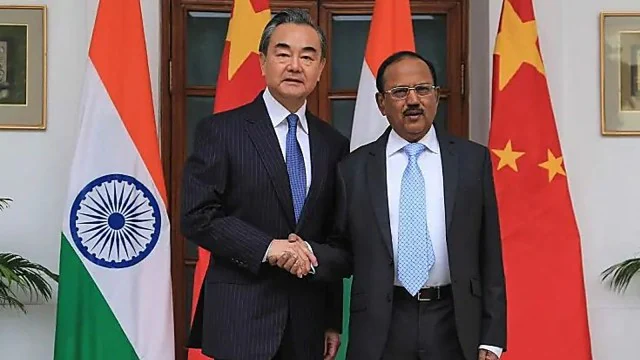
India, China set to hold special representatives’ meeting tomorrow
India and China’s special representatives on border issues are set to meet on Wednesday in Beijing to discuss restoring bilateral relations following the October 21 agreement to disengage troops in eastern Ladakh.
Wang Yi, director of the office of the Central commission for foreign affairs of China, and India’s national security adviser (NSA) Ajit Doval will hold the 23rd meeting of special representatives for the China-India Boundary Question on December 18, Chinese foreign ministry spokesperson Lin Jian on Monday.
Ajit Doval is expected to reach Beijing on Tuesday for the talks, which aim to explore steps to normalise relations between the two countries.
The Special Representatives (SR) mechanism was established in 2003 to address the dispute related to 3,488-kilometer India-China border. It has convened 22 times, with the last meeting held in 2019. In 2020, the special representatives of India and China on the Boundary Question held a telephonic conversation.
Although the mechanism has not resolved the border dispute, both sides view it as an effective tool for addressing recurring tensions.
Relations between India and China, except for trade, have remained largely frozen since April 2020, when Chinese troops moved toward the Line of Actual Control (LAC), triggering a prolonged military standoff.
External affairs minister S Jaishankar on December 3 said that India remains “committed to engaging with China through bilateral discussions to arrive at a fair, resonable and mutually acceptable framework for a boundary settlement.”
Speaking about his recent meeting with Chinese foreign minister Wang Yi, Jaishankar said they had agreed that the special representatives and foreign secretary-level mechanisms would convene soon.
Briefing the Lok Sabha on India-China relations and the disengagement process at the Line of Actual Control (LAC), Jaishankar noted that bilateral ties have been “abnormal” since 2020, when “peace and tranquillity in the border areas were disturbed due to Chinese actions.”
He added, however, that recent developments, reflecting ongoing diplomatic efforts, have moved the relationship towards some improvement.
“Our relationship had progressed in many areas but was clearly impacted by recent events. We firmly believe that maintaining peace and tranquillity in the border areas is essential for the development of our ties. In the coming days, we will discuss both de-escalation and the effective management of activities in the border areas,” Jaishankar told members of the Lok Sabha.
Foreign secretary Vikram Misri announced on October 21 that the disengagement agreement was finalised after several weeks of negotiations and would help resolve issues that arose in 2020. On October 22, the Chinese foreign ministry confirmed the agreement, saying, “The two sides have reached resolutions on relevant matters, which China speaks highly of. Going forward, China will work with India to implement these resolutions.”
Prime Minister Narendra Modi and Chinese President Xi Jinping endorsed the agreement during their meeting on October 24 in Kazan on the sidelines of the Brics summit. They directed the special representatives to meet to discuss further steps.
Additionally, external affairs minister S Jaishankar and his Chinese counterpart Wang Yi met during the G20 summit in Brazil, followed by discussions under the Working Mechanism for Consultation & Coordination on China-India Border Affairs (WMCC).





